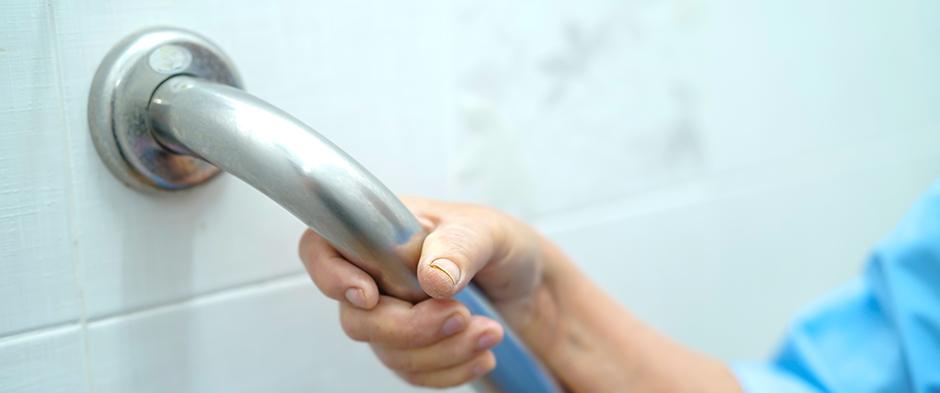
Disability Aids Explained: What's Out There and How Can it Help?
Sally Madeley-Carr, OT21 Apr 2020
The market for mobility aids in the UK has exploded in recent years. As the population gets older and awareness increases of the type of products available, this trend is set to accelerate at an ever faster pace. The internet provides those who might be in need to see for themselves the breadth of product which is accessible, so awareness is improving all the time.
Older people are one section of society which is particularly prone to problems surrounding mobility. Disability equipment for elderly people is being supplied across the country in many different guises.
Some home adaptations are supplied free of charge by local authorities. You may be entitled to have things like a second stair rail, intercoms for the front door, wheelchair ramps, walking frames, perching stools and grab rails supplied without having to pay.
In order to explore your eligibility, the first step is to discuss your situation with your GP, occupational therapist or another medical professional charged with your care.
You might also approach the adult social services department at the council in your area. They will then arrange a home assessment visit by an occupational therapist.
The role of occupational therapists
If you’re unfamiliar with the term, an occupational therapist (or OTs as they’re commonly called) provides support to help overcome practical barriers which might prevent someone doing their daily activities. An OT’s goal is to assist people maintain independence in all aspects of daily life.
The term ‘occupation’ in this context means the activities which the individual undertakes as part of their daily routine and which they may associate with their sense of identity. It can include fundamental tasks like feeding oneself or keeping oneself clean, but also ‘occupations’ like leisure activities or work-life.
Many OTs specialise in particular areas. Some might focus on adults, older adults, adults with specific conditions or paediatrics. In each case, they attempt to find ways to overcome the practical effects of illness or disability. Commonly, this includes those with physical disabilities, mental health issues or learning disabilities.
Occupational therapists work for the NHS, social care settings, health organisations, education services, housing, as private practitioners and in the voluntary sector. They are frequently found operating alongside psychiatric services, law enforcement and fire services.
They carefully analyse an individual’s personal circumstances and the key arenas of their lives - environmental, psychological, social and of course physical. Together, improvements and support help people overcome disabilities and illnesses whether they’re down to infection, injury or simple ageing.
This kind of assistance often makes a tangible difference in providing a fresh sense of independence and optimism for the future.
Gadgets and disability aids
Essential Aids supplies a wealth of disability equipment for elderly people as well as those with disabilities. We have developed the most comprehensive range online in the UK, with products chosen because of their effectiveness and quality.
Here we’ll talk about some of the most popular and frequently bought. We’ll run through it room by room.
The bathroom
Grab rails are essential pieces of kit for many people in the bathroom. If you have impaired balance or strength, secure resting points become vital. A grab rail is a versatile disability aid in that one can be fitted exactly where you need it.
Straight versions are available, along with rails which are curved, allowing you to fit one to suit your precise requirements.
They are effective next to the sink, by the bath itself, the toilet or in the shower. If you need extra support around the toilet, one of the large u-shaped drop-down rails might be a good option. These fold down when in use and then up against the wall when they are not needed. Some feature and additional drop down leg which connects with the floor, providing an extra feeling of solidity.
We would always recommend fitting by a qualified tradesman.
Other aids which seem simple but which incrementally can have a transformative impact, include things like bath mats and tap turners.
Bath mats provide the obvious function of reducing the chance of someone slipping, either on the wet floor of the bath or shower.
Tap turners fit to existing taps but increase their leverage. This can make a big difference to people with restricted strength or hand dexterity, both of which are common effects of arthritis.
The various forms of grab rails are key tools for using the toilet. For those who might have difficulty sitting down and standing up unsupported, fitting rails next to the pedestal can make a big difference.
Toilet frames do a similar job. They are usually made of lightweight aluminium, making it easy to move them into position. They provide a box-like support frame around the toilet, with support on either side of the individual’s body. Some have an in-built toilet seat, while others allow you to use the existing seat.
Raised toilet seats are another toileting aid which is useful for those who struggle with transferring on and off the toilet. By lifting the overall height, the distance of travel from standing to sitting is reduced, putting less strain on the body.
A raised toilet seat usually attaches by means of secure clamps, preventing it from slipping when in use. The seats are available in different heights, so you should be able to find one which suits your specific needs.
If someone is unable to make the trip to and from the bathroom, commodes come into their own. Available in a variety of styles, they effectively provide a portable toilet which you can use in the bedroom or elsewhere.
Some have discreet wooden finishes and a padded seat which fits over the pan, concealing it and making the commode blend in with the rest of the furniture. This type does not usually have wheels, however.
Other models are made of metal and moulded plastic and usually have wheels. Many can double up as a temporary wheelchair, helping transfer the patient to and from the bathroom.
Commodes can be especially useful when recovering from an operation or injury, which makes normal travel around the home difficult.
Kitchen and dining
There is now a wide range of disability equipment for elderly or disabled people to choose from. Cutlery is available with special handles which makes it easier to control than standard knives and forks is one common adaptation.
Others come with straps which fix the handle of the cutlery to the person’s hand, making it less likely to fall as they eat.
High-sided dishes and bowls are another popular choice. These make it easier for the user to press food against their walls, making it easier to scoop up.
There are also kitchen knives with ‘L-shaped’ handles which allow someone to slice food while keeping the wrist in a neutral shape, reducing strain on that area of the body.
Having two handles makes a big difference if you have a hand tremor and find it difficult holding regular cups or mugs. Cutlery with ‘built-up’ handles is also beneficial for those with this issue. Wider handles tend to require a less tight grip and are easier to keep stable.
Living room
As with other rooms in the house, support rails play a big part in the living room. While wall-mounted versions are more suited to the bathroom or kitchen, there are some clever rails which are great to help you get up and down from sofas and armchairs.
Essential Aids’ Couchcane is one such innovative product. It anchors firmly to underneath a couch or armchair and provides a vertical, stable support with a grab handle at the top.
The person can use it to pull themselves up from a sitting position, or stabilise them as they sit down. It also features a handy pouch, in which things like TV remote controls can be kept.
Other aids include chair raisers to increase the height of seats, reducing the distance of travel from sitting to standing and visa versa.
Bedroom
If someone is confined to the bedroom for long periods, there are aids to improve their mobility in small ways even in the bed itself.
The simple act of moving from lying down to a sitting position for example is something some people struggle to do unaided. A bed rope ladder may help solve this problem. It fixes to the foot of the bed and allows the user to gradually pull themselves up, rung by rung.
Dressing aids like claw-reaching aids, button hookers and sock aids are also fundamental to the daily lives of many people facing compromised mobility. Essential Aids has an extensive range of these types of aid.
The stairs
Handrails for staircases are a must if your balance is compromised as you may be vulnerable to falling. This is especially true if the staircase is enclosed and doesn’t have a bannister rail on one side.
As well the relatively simple installations like a handrail, many elderly people now opt to have a stairlift fitted. While these represent a significant financial expense, they can have a transformative impact, making the entire upstairs accessible once more, without the risk of climbing stairs unaided.
General mobility
Essential Aids supplies a massive range of mobility aids like walking frames, rollators, wheelchairs, wheelchair ramps, reaching aids, walking sticks and many more.
With the average age of the population of the UK increasing every year, we’ll see more and more innovative ideas which lead to products helping to keep people in their homes for longer.
With the government prioritising home adaptations, the hope is that public funding also grows in line with this need.

Sally Madeley-Carr, OT
Sally qualified as an Occupational Therapist in 1996 and is a well-respected professional in the field of rehabilitation equipment and living aids. She has worked in private practice and within the NHS, developing a broad experience with adults and children. Click here for Sally's registration with the Health and Care Professions Council. The HCPC regulates health, psychological and social work professionals in the UK.